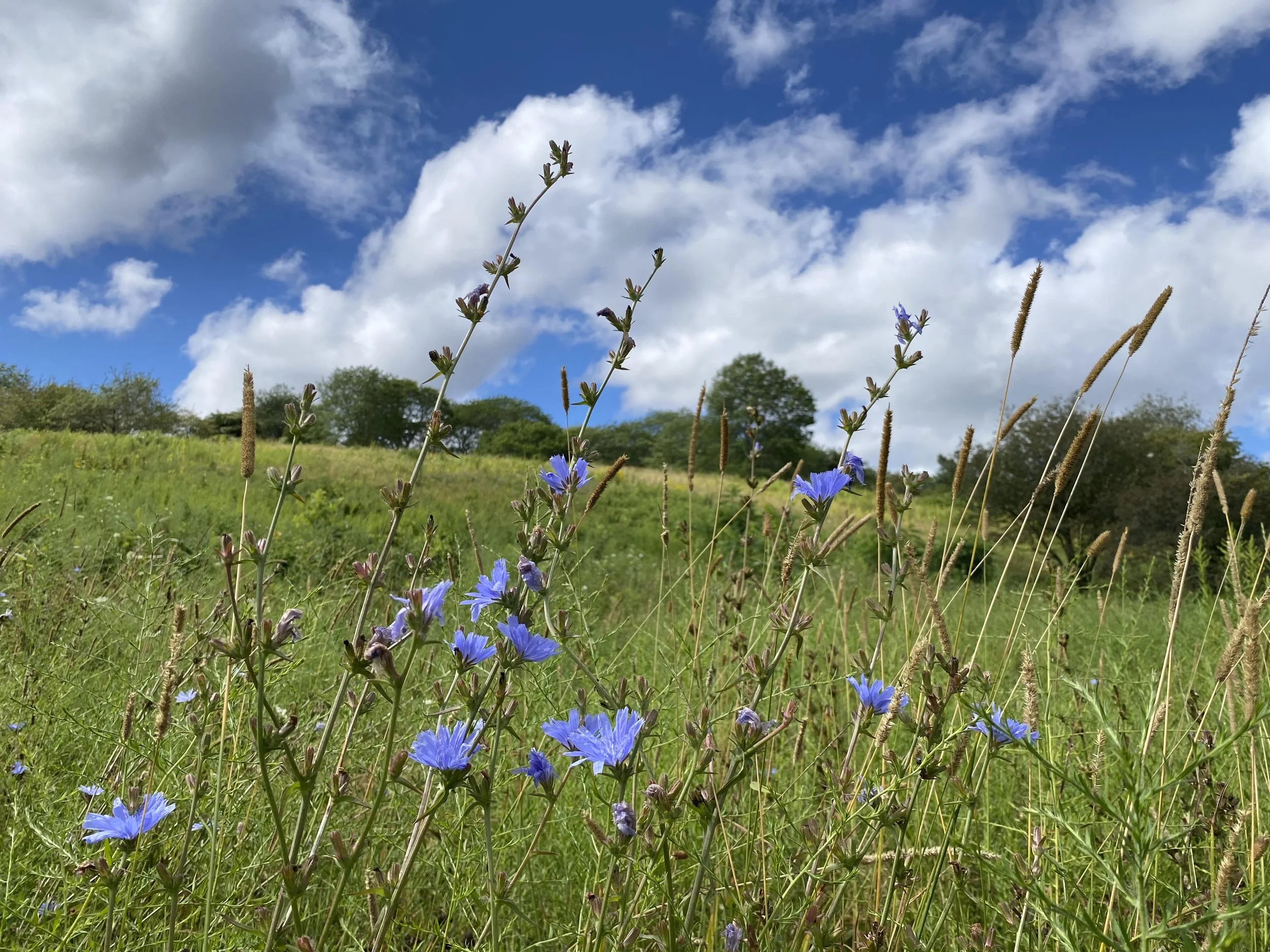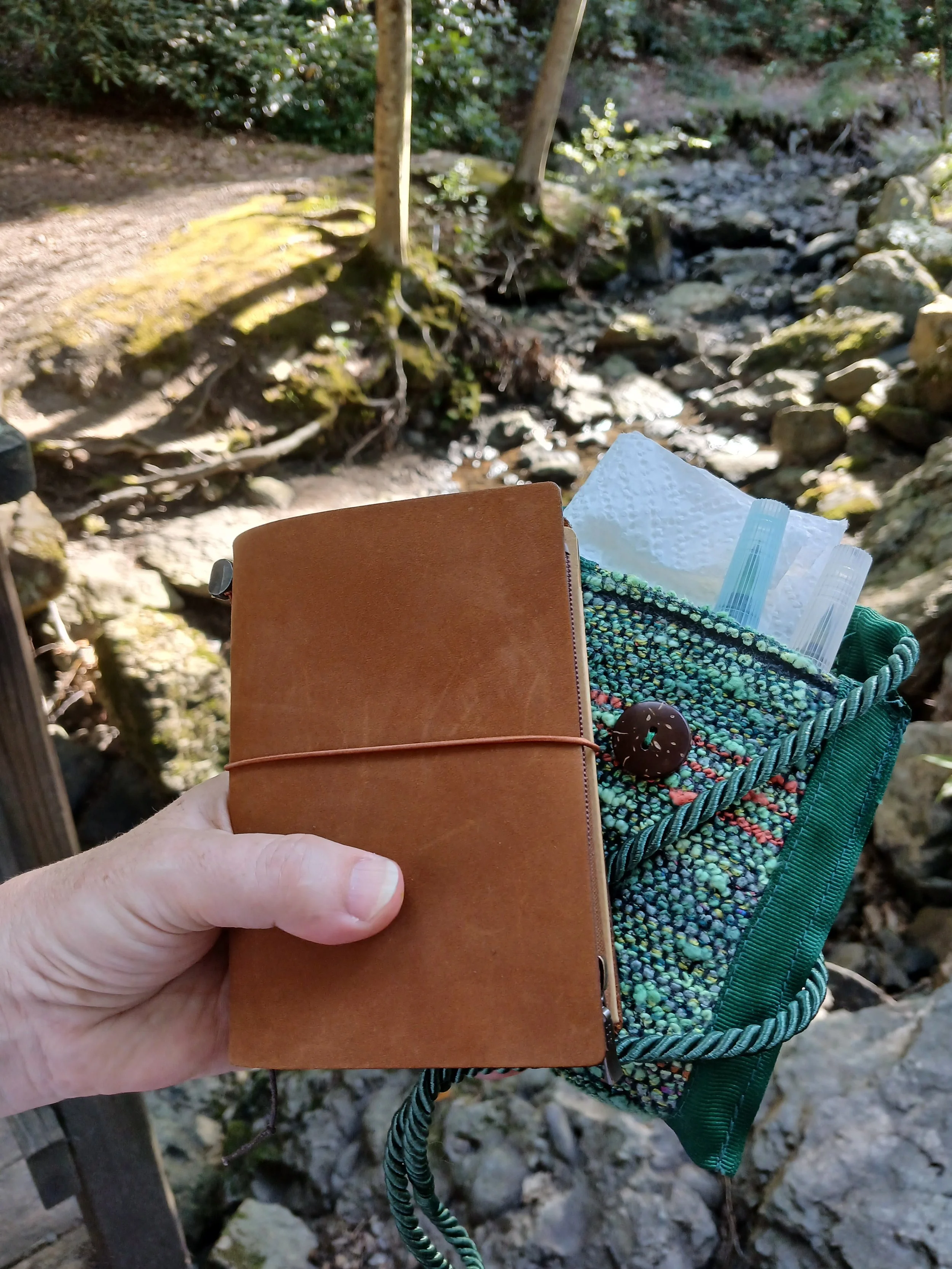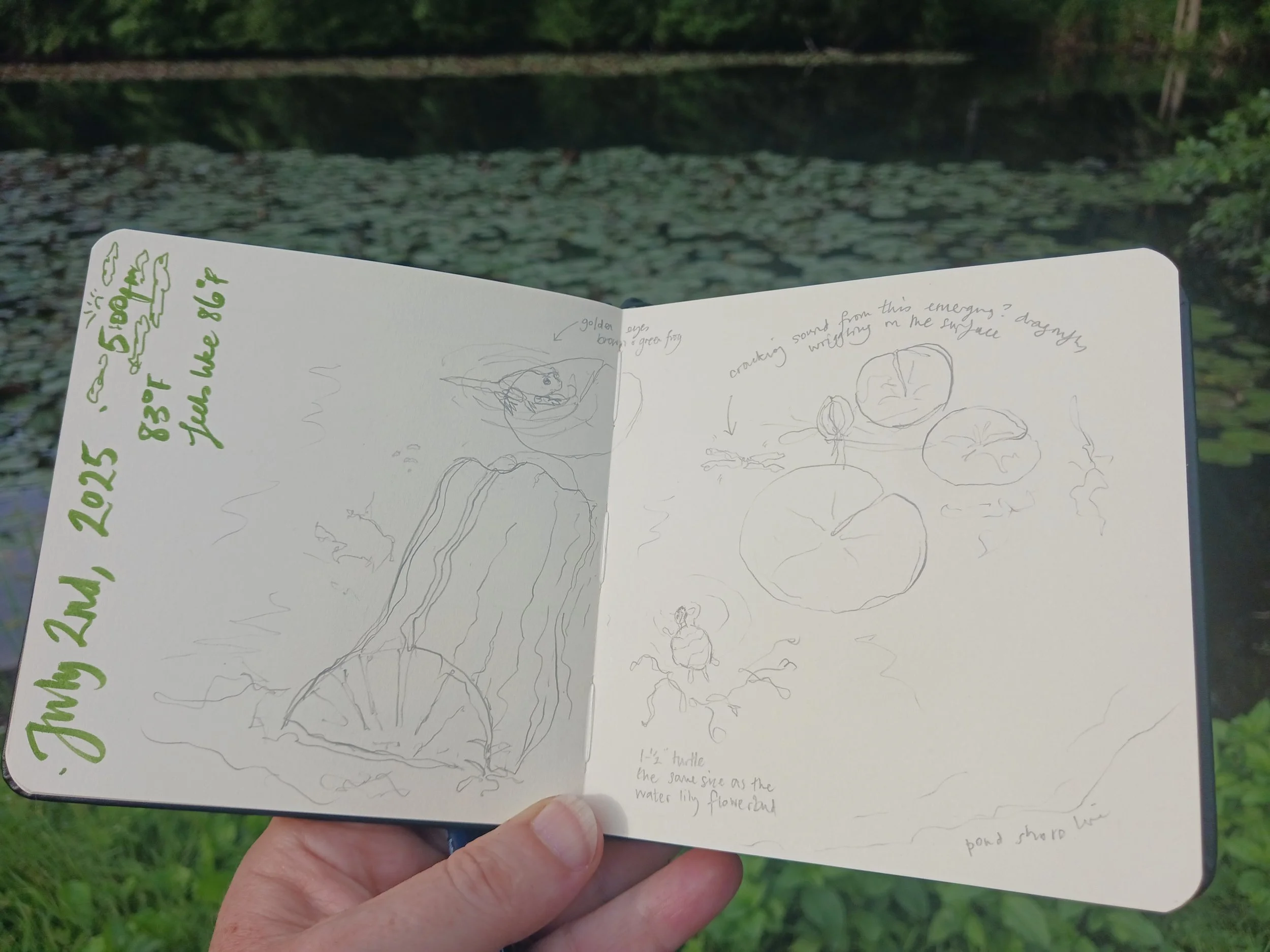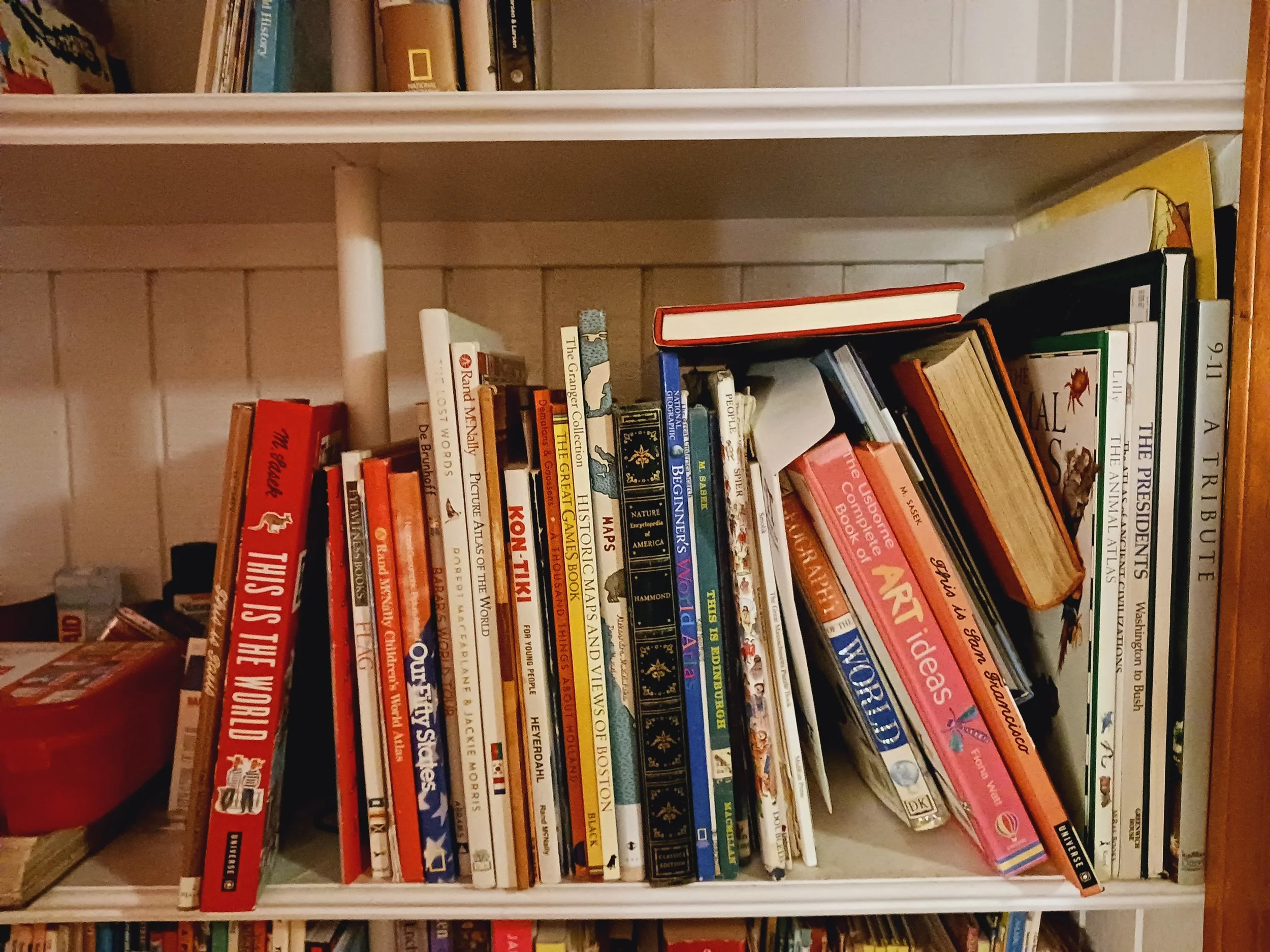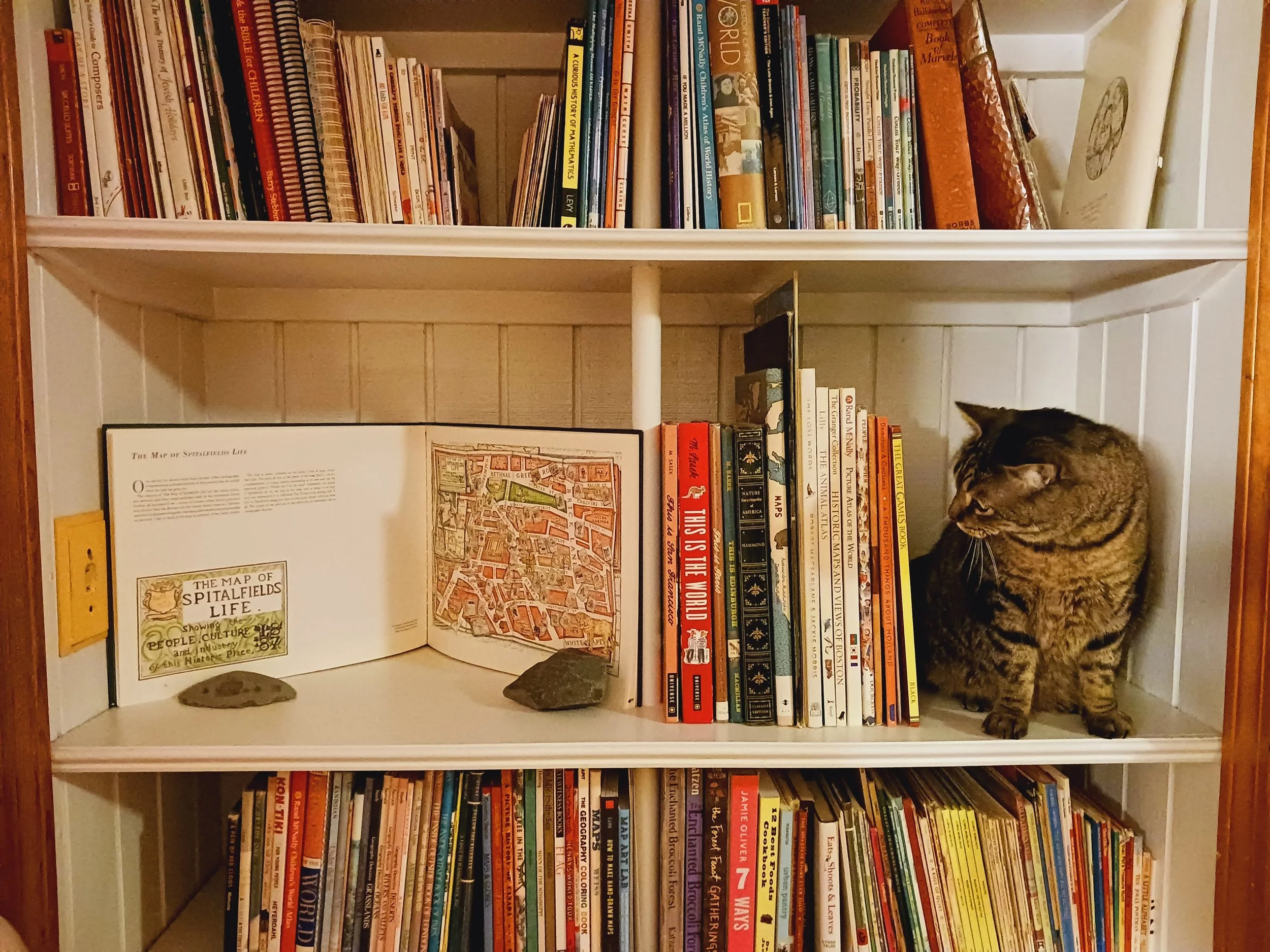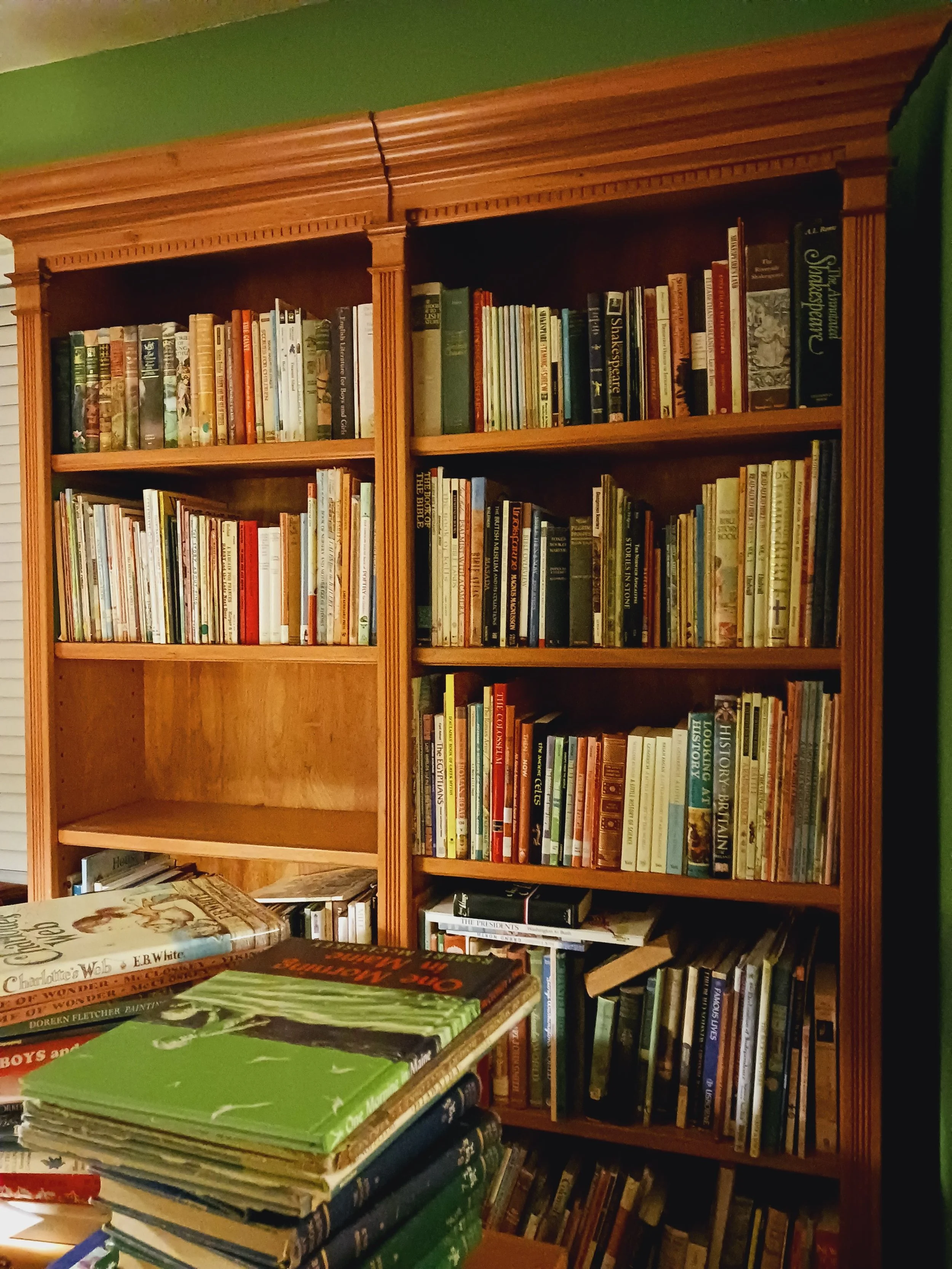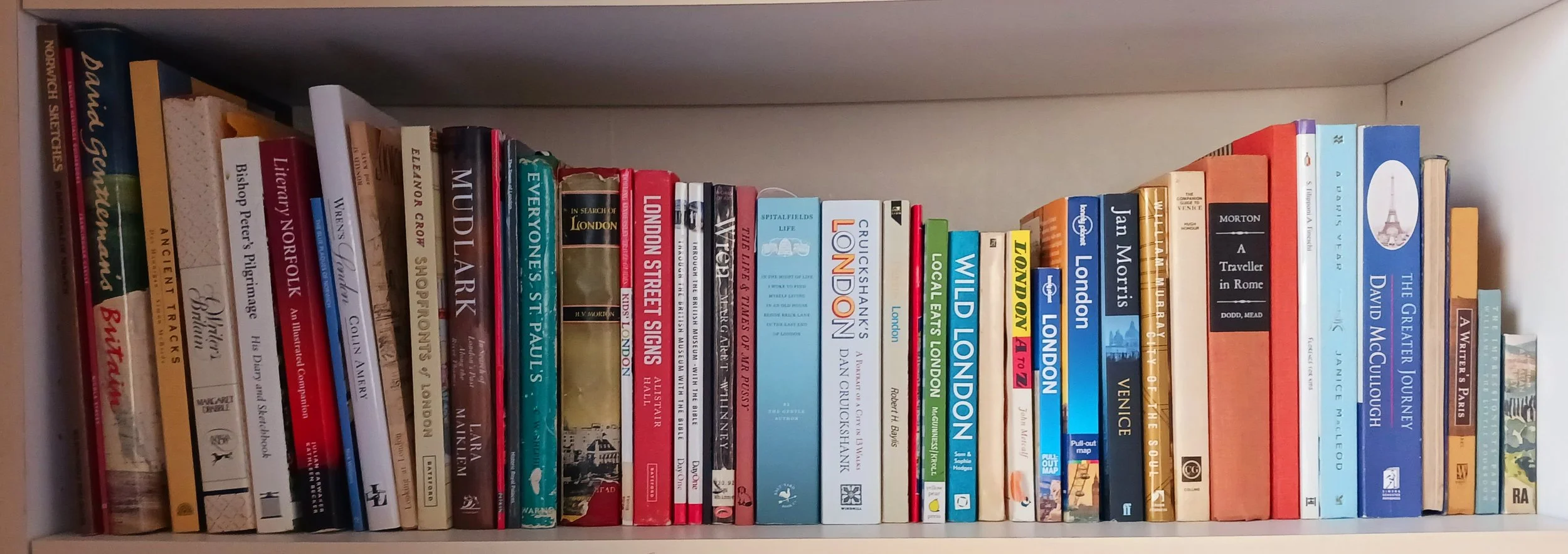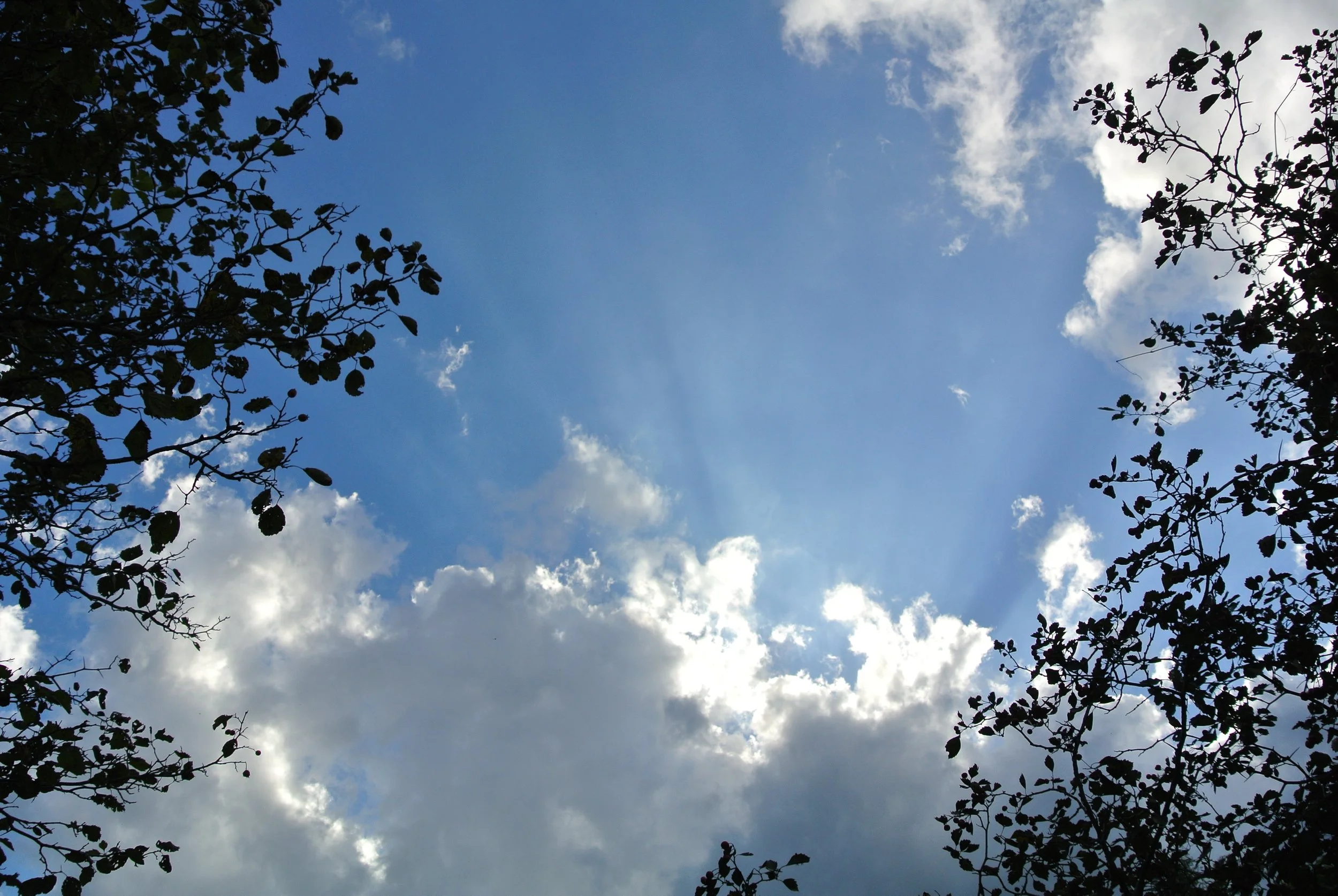Storm and Summer, Stream and Still. All these are Anglo-Saxon words, I learned this week, and they encapsulate this season for me.
Storm
A repetitive use injury that my son developed over two years bloomed into a crisis a few weeks before finals in the spring. ER visits, ortho doctors, imaging, a flurry of decisions, all these morphed and settled into a rhythm of twice-a-week PT visits all summer long. A repeating cycle of some progress and more setbacks, fourteen weeks of care, and many canceled plans.
We are still searching for answers and a way through. Storms.
Harvard’s Peters Hill meadow with the fast-racing clouds that were the edge of Hurricane Erin. The meadow is loud with late-summer insect thrum. I walk to this meadow every day to enjoy the sound since it will be mowed and gone in just over a month.
Learning about pain that persists and ways to break the cycle; listening, journaling on my son’s behalf, and gathering symptoms; looking elsewhere for advice and care after fourteen weeks in the same practice with few answers; being the crux and hinge of that care, yet also looking after myself, has been the work of my summer.
Looking after myself looks like walking, journaling, and doing six simple home tasks most days. Also, sketching, taking time to notice, and capturing that in some simple drawing or note.
The moment radiating out from a still center, the quiet actions that make for peace. What are your few necessities that keep you grounded?
Stream
I walk frequently to Bussey Brook at the foot of Hemlock Hill in the Arnold Arboretum. I grab my regular nature journal as I leave the house, or sometimes, the small watercolor kit that invites holding and using.
Traveler’s Notebook, Passport size with sketchpaper insert; pouch with spray bottle and waterbrushes
Paints and paper in one little package, easy to grab on the way out the door
Travelers Notebook canvas insert, holds my color chart and paint palette
Art Toolkit palette, the size of a business card holder
This curious mullein growing sideways and then upright by the side of Bussey Brook drew my attention whenever we walked that way; meanwhile my daughter looked for frogs.
A warm spot to sit on a natural puddingstone seat
A little bit of color mixing and noticing fun
I take that noticing back with me into the fray of chaos and news, weather, and vagaries of health—the things I can't control, layered over with the few things that I can.
Still
And stillness ...
Sitting at the still pond of Boston's last farm each week when I pick up my weekly share of veg, the abundant frogs squeaking and leaping from their lily pads when my shadow falls on the shore. They reemerge gradually and resume their floating, golden eyes above the surface, the longer I sit still in the afternoon heat.
The still pond at Allendale Farm, Boston
My regular nature journal, a small Royal Talens square sketchbook
Simplest tools: a mechanical pencil and olive green Pentel Sign Brush Pen
Attention Cottage
In all this, I’m not only looking after myself through a season of storm, but also attempting to build my version of an ‘attention cottage’.
Alan Jacobs stated in a post last year:
Our attentional commons is borked, it’s FUBAR; it’s not stunned or pining for the fjords, it has ceased to be, it is bereft of life, it is an ex-commons.
The death of the attentional commons has had dramatic and sometimes tragic consequences for every individual’s store of attentiveness.
What I want to argue today is that the attentional commons cannot be rebuilt unless and until we rebuild private and local/communal spaces of attentiveness.
… What I need, what I am trying to build, is — I coin this phrase by analogy to a memory palace — an attention cottage. This could be an actual place, like the boathouse in which E. B. White wrote:
Photo: Jill Krementz
“But few of us will be so lucky. Most of us will have to build our cottage from scraps, and a good bit of it will need to be virtual. When I sit down in a chair with a book in my lap, a notebook at my side, and no screens within reach or sight, I am dwelling in my attention cottage.”
Reading
The very dishevelled ‘before’
I decluttered every shelf in the house over three months at the close of last year. I was already into the project, but I joined an accountability group and pushed on with more purpose and crossed the finish line of the whole job. Two hundred and two feet of shelving.
In process
I donated at least one bag of books, sometimes a flurry of six or seven, every week throughout the three months. The constant flow of stuff out enabled me to keep tackling the next space. Some I walked down to our Boston Public Library branch in the book sale donations tub. Others, I drove to a thrift store with a great drop-off drive-through.
I would take a photo of the donation before handing it over, and text it to one of my adult kids.
"Go, mama. You did it!" would come the relentless encouragement. Celebrating small wins helps keep momentum.
And done: with enough room to seat a cat
Finishing Energy
I had an injury of my own last December, falling down stairs. Though I didn't break my ribs, the bruising took several weeks to allow lying down, and five months to resolve completely. The initial need to rest meant a trip was canceled.
My family, invested in seeing the book decluttering goal met, helped with the last physical acts of moving books, shelving them, gathering donations, and getting those out of the house.
The last donation of fifteen Trader Joe's bags of books was a triumph of finishing energy, with everyone pitching in.
Finished at the top, in process at the bottom
"Well, we freaking did it!" I posted to my online accountability group on the day I’d set as the deadline.
The resulting emojis, cheers, and celebration also helped.
Travel books are a favorite
Your Own Clutter Threshold
The books that remain represent a quiet, deliberate choosing of the way ahead.
And there are admittedly more of those than can be read in a lifetime. I am no minimalist. My attention cottage does not in any way resemble that E.B. White boathouse. But with the deliberate choosing, there is a mysterious phenomenon—finding one's personal clutter threshold.
I came across this idea in the incomparably helpful book, Decluttering at the Speed of Life.
I cannot tell someone else what their clutter threshold should be. Mine involves visual abundance but organizational simplicity. I thrive on the many, on visual collections, but appreciate things grouped and contained in simple ways—baskets, shelves, containers of one sort or another.
A basket of sketching supplies invites me to use them and enables me to find them as I leave the house. Materials that are not out of sight.
My art studio is one container. The small shelf of reading material in the dining room is another. A deliberately chosen visual reminder to me to read when I eat lunch.
I often have to make myself use that space and not eat at my desk. I'm always glad of the physical and mental break, traveling far away with words, even as I step to a different room and take time there to eat.
Reading at Lunchtime
And so, a renewed commitment to reading flowed from all those decluttering choices.
There’s no quicker way to stop the spiral of online scrolling than to read a physical book.
This summer, I read a book of walks in London with lovely watercolor maps that I want to use as a springboard for my own map-making. Each walk conjured up reminiscences or new unknowns. I saw each street, each stop, and read each detail. By the time I finished the last of the walks, I felt as though I'd visited London fifteen times.
Other reads: Monica Dickens' children's novel on the Great Fire of London, a one-lunch read that carried me back in time, vicariously to the tumult and smoke.
L.M. Boston's memoir, Memory in a House, took me to Fen country during World War II, a single woman alone, renovating England's oldest inhabited house, the setting for the Children of Green Knowe series.
Thoughts & Adventures
That complete, I picked up Churchill's Thoughts and Adventures, mine a lovely 1932 copy I bought in a second-hand bookstore in Norfolk just before 9-11 and had never read right through.
I wondered about the previous owner, their distinctive name, and signature. Researching, I soon discovered Chetwode Hamilton was the former Dean of Windsor, spiritual advisor to King George, presiding over his funeral—there he was in a car with Churchill—and to the Queen for the first ten years of her reign.
I handled the book with love and read it most days. It ends with Churchill’s exhortation to take up painting, but on the way, he detours to hair-raising tales, especially the chapter on the early days of aviation, which I enjoyed so much, I read it three times.
Reading at Bedtime
I finally get it.
Act on it, get it—not ‘I ought to know this, but in reality ignore it.’
Putting my phone away at night greatly impacts the whole sleep routine.
And so, instead of scrolling through news, I read before sleep, like the novels by Elizabeth Goudge that I've revisited throughout my life and from which I've drawn strength.
With the dross cleared away and order to my shelves, I came to as though out of a daze and remembered how much I needed those novels in this season.
Stille, Storm, Strēam, Sumer
Now I'm reading a history of Lindisfarne aloud with my daughter—Holy Island, off the coast of Northumberland in England, is a place of special memories to me. The book was one uncovered in the tidying.
We're exploring the Anglo-Saxon world, enjoying the lectures of Professor Michael Drout, and venturing into the world of learning Old English.
Stille, Storm, Strēam, Sumer.
Anglo-Saxon Glossary, The Phoenix, from The Exeter Book, edited by N. Blake
Beauty in the midst of storms. Peters Hill meadow, August 2025.
Moonset and dusk, Peters Hill meadow, August 2025
These are a few of my answers so far.
The narrowing down of opportunities because of caring for another has not stopped these experiments in deliberate choosing.
Upcoming In-Person Event
In the Boston area in early October?
Join me for in-person typewriter letter writing at the West Newton stationery store, The Paper Mouse, on Saturday, October 11th, 1:00-3:00 pm, and afterwards for a free one-hour open house.
(A repeat of this event). The first two hours are a ticketed event, and tickets are still available.
